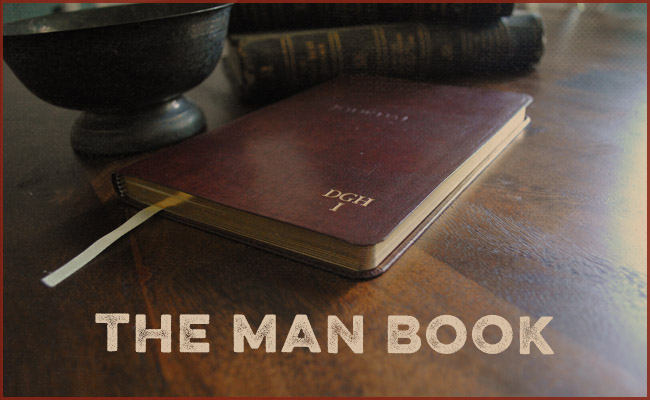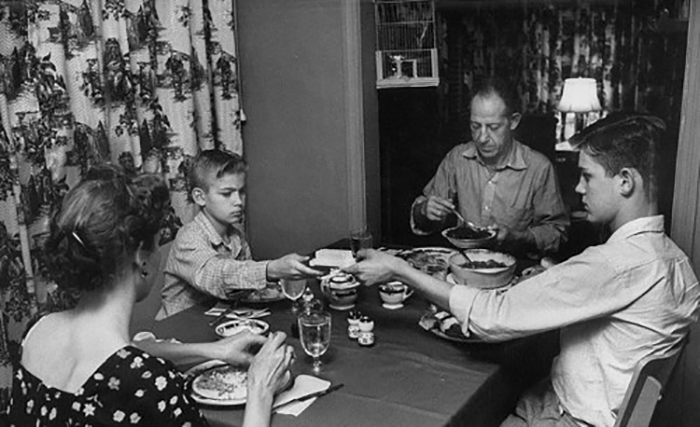With our archives now 3,500+ articles deep, we’ve decided to republish a classic piece each Friday to help our newer readers discover some of the best, evergreen gems from the past. This article was originally published in June 2019.
Editor’s Note: This is a guest post from Dan Hickey.
Wisdom is not a product of schooling but of the lifelong attempt to acquire it. —Einstein
In May of 2011, while scanning the Long Island Sound on the top deck of the Port Jefferson ferry, I had an epiphany. At 25 years of age I had lived roughly one-third of my life and it struck me that the hazy image of the man I aspired to be in the future might not come to fruition merely with the passage of time. The man I envisioned myself being at 50 years old would be the product of what I focused on building into myself in the intervening 25 years. It was at that moment that I first decided to get serious about the man I was becoming instead of drifting in the current with only a muddled picture of what it meant to be a good man.
The first step was to think about what kind of man I wanted to be at 50. The list grew to ten attributes around which to focus my intentional growth in the hopes of embodying those things in the future:
- A Devoted Man of God
- A Steadfast Husband
- A Loving Father
- A Family Builder
- A Loyal Friend
- A Community Builder
- A Leader and Mentor
- A Healthy Man
- A Lifelong Learner
- A Virtuous Man
At that time I was not a husband or a father and had only scratched the surface of the other aspirations. The list was lofty and the road to accomplishment looked daunting. I knew my wisdom was too finite to hew and polish each of those ten facets and that I needed the acquired knowledge and life experience of others, further down their roads, in order to make my way. I was the man in Frost’s “The Road Not Taken,” peering down my path in the hopes of viewing the clear way, able to see only until it “bent in the undergrowth.”
Proverbs 4:6-7 makes the value of wisdom clear: “Do not forsake [wisdom], and she will keep you; love her, and she will guard you. The beginning of wisdom is this: Get wisdom, and whatever you get, get insight.” Verse 7 illustrates that the first step of wisdom is to get more wisdom — to recognize your own limitations and passionately pursue more knowledge. So, I began to do a lot of talking, reading, and thinking around my ten areas of focused growth, finding inspiration in a variety of places and mediums. I quickly realized that I needed a place to hold the precious wisdom I was encountering, lest it slip through my mental sieve.
If you’re like me, you’re a chronic journal starter. Every January 1st, every new stage in life, every precipice of a fresh chapter, and I’m throwing the bowlines off a leather-bound hull. Two weeks later it’s languishing in port, the charging zephyr that puffed its sails having quickly abated. I knew I needed something different.
So I started what I call my “Man Book” — a repository for any wisdom, inspiration, goals, aspirations, or reflections that will aid me on my quest to become the man I want to be. Creating my Man Book allowed me to become a seeker and collector of wisdom and knowledge; the quest for the thoughts of great men became a treasure hunt in which I was seeking out the invaluable nuggets like gold hidden away in a long forsaken corner of a cave.
This book has become a cherished companion over the last eight years and is an indispensable part of my daily growth as a husband, father, and man. It is a reservoir of timeless knowledge and inspiration that I can drink from when I feel dry, gain rejuvenation from when I’m tired, and orient myself by when the branches slapping my face signal that I’ve wandered off my path.
What Goes Inside
There are a variety of ways I utilize my Man Book that I’ll outline below. The book is intentionally not separated into sections. I want my acquisition of wisdom to be free flowing, allowing me to look back on how my thinking has ebbed and evolved over time.
Acquired Wisdom. As previously noted, a big thrust behind creating the Man Book was having a repository of wisdom to be mined as needed. Areas where I’ve found that wisdom include:
- Quotes. Inspiring quotations can come from anywhere: exemplars, poems, songs, movies, etc. A well-spun quote is able to succinctly capture a profound idea that can immediately reorient or reinvigorate our thinking. Churchill, C. S. Lewis, Lincoln, Franklin, and others litter the pages of my Man Book.
- Lessons. Lessons gleaned from key men in my life (father, grandfathers, HS track coach), role models/heroes (Theodore Roosevelt, Louis Zamperini, William Wallace), and men I’ve read about (Pete Maravich, Mickey Mantle, Santiago from The Old Man and the Sea) are written in the book. Every man I’ve ever encountered on the page or in person has a lesson worthy of either caution or emulation.
- Book Notes. I never read a book without a pen nearby. I am always on the lookout for a grain of wisdom or inspiration to further my journey. Instead of taking the time to reread Tim Keller’s The Meaning of Marriage or Andy Crouch’s The Tech-Wise Family (after all, I have 1,495 books in the “to read” section of my Goodreads account), I can reference my notes to be reminded of the ideas that resonated with me. It also allows me to mobilize my library by giving books away to others, instead of having them languish on my shelf. I don’t need the whole book when I have the essence. (Of course, there are a few hardback favorites I will never part with.)
Reflection. Though the Man Book is not a journal per se, reflection is an important part of growth and the Man Book can help facilitate that.
- Traditional Journal Entry. There are only three or four entries in my Man Book that would be considered typical of a journal and they tend to be connected to major moments in my life (my marriage, the birth of my son, etc.). Key moments/milestones in life have a way of bringing what really matters to you into greater relief. Cataloging those thoughts can be very helpful in your future growth as they often signal what is True North in your life.
- Thanksgiving. Each November, along with limbering up for my family’s four-hour Turkey Bowl, I’ve built a habit of writing down the things I am grateful for, ranging from my health to the sound of my daughter’s laugh.
- Yearly Resolutions/Focus. New Year’s resolutions are great and I respect anyone who sets out to, in the words of Ben Franklin, “let every new year find you a better man.” I’ve moved away from yearly resolutions, though, and toward a short list of things to focus on for the year. This year I am focusing on growing in patience, evaluating how I use technology, and serving others more, among a few other things. Those are not things I can quickly check off; they’re areas I hope to grow in over the course of 365 days.
- My Obituary. Despite the morbidity of the exercise, I wrote out my obituary last year. It is a summation of a life well-lived that I now aspire to.
- Weaknesses. I did some self-reflection and identified where my weaknesses are. I hope that keeping them at the forefront will help me continue to refine them.
- Intentional Manhood. Each month I list 2-3 things in each of the ten areas I’m focused on developing, that, by accomplishing, will move me further along the continuum of being the man I aspire to be. This month in the category of “A Community Builder” I made it a goal to write encouraging notes to five coworkers and invite some church friends over to our house for fellowship. My hope is that targeting small, achievable things each month related to the areas of my holistic picture of manhood will move me forward.
Goal Setting. Whitman makes his way onto numerous pages of my Man Book. The line that has meant the most to me personally comes from “O Me! O Life!”: “That the powerful play goes on and you may contribute a verse.” I have long considered the logical follow-up question Robin Williams offers his class in the film Dead Poets Society: “What will your verse be?” Setting goals for ourselves ensures that we will have something to offer the greater script, something of value to contribute and leave behind for others.
- Things to Do. I don’t have a bucket list; I have a to-do list. I find a bucket list a little morbid (says the guy who wrote his own obituary at 33). Running a marathon, reading 1,000 books, and visiting Ireland are on my list. The list keeps me dreaming and prevents the sense of adventure from dimming in my life.
- Things to Learn. I believe the definition of manhood is the recognition that we are never completed works. The life of a man should be constant striving, growing, refining. There is always more to learn: knowledge to absorb, skills to acquire, experiences to have. I write down what I want to learn.
- Family Mission Statement. With the help of my wife, this year I crafted a family mission statement. It sums up what we want to be about as a family: quick to forgive, honest with each other, welcoming to others, etc. If we are in a rut as a family or if a feeling of frustration settles over us during a particular season of life, my hope is we can look to that as a way to reorient our habits, attitudes, and behaviors to achieve our greater goals as a family.
- Routines/Habits I Aspire to Build. Current routines/habits I’m thinking through include what I do with my mornings, how I use technology, and how I use the sabbath. Aristotle tells us, “we are what we repeatedly do,” so being intentional about our habits and routines can have a profound impact on us.
Spiritual Growth. If spirituality isn’t something that manifests itself in your life, that’s okay. For many of us, though, religion, faith, and spirituality are an indispensable part of who we are and our understanding of what our purpose is. For millions of Muslims, Christians, Hindus, Jews, etc. faith is a focal point from which everything else flows. Thus, ensuring growth in that area is vital.
- Favorite Scriptures/Prayers. Verses from the Bible, Koran, Tanakh, Bhagavad Gita, etc. have the potential to not just inspire us, but to become fused to our very identity — to give us life and direction. Write those verses down and they will provide you with a compass.
- Scriptures Where You Are Weak. Identifying where we are spiritually weak or vulnerable is the first step toward increasing our strength. Identify those areas and write down verses that will help you bolster those areas in your life.
- Sermon Notes. A priest, pastor, imam, pujari, rabbi, etc. has often risen to his position through years of study and prayer. The leader of your church, synagogue, mosque, or temple can be a font of wisdom that can aid you on your life’s journey. Instead of sliding into catatonia the next time you’re in your place of worship, grab a pen and listen for at least one thing that will help you take a step forward in your journey. Date the entry and put it in your Man Book.
Lists. Lists can distill things down to just the important stuff. No fluff.
- Men I Admire. I have a personal Hall of Fame of men who have impacted me or inspired me — men I’ve both known closely and emulated from afar.
- Things to Teach My Kids. How to throw a baseball, respect the flag, how to build a snowman, save mementos, etc. It is my vision of a good and successful life packaged into small things I want to pass on.
- Family Traditions to Start. My son is 3-and-a-half; my daughter 21 months. I have thought about what traditions I can start now and which ones I want to incorporate in the future so that those things are not lost in the busyness of life.
- Dad Ideas. One of my primary goals as a father is for my kids to know I love them through the time I spend with them and the memories I create. Waking up for a meteor shower, having an indoor picnic on a rainy day, and making homemade ice cream are all tangible things that will let my kids know they are valued. When I can’t think of something to do, I have a list to reference.
Where to Start
1. Choose a Book. Any journal will suffice. I chose a simple leather desk journal — one that has a timeless look and durable quality. Whatever you choose, I would challenge you to make it a physical, tangible book so that you can write in it. (Oh, and spring for the monogram if it’s an option, even though it’s a few extra bucks. This is an heirloom and deserves the austerity of embossment.) Here are three reasons why I think it’s important to elevate the pen above the keyboard for your Man Book:
- After a lifetime of using your Man Book you’ll have built out a small library of wisdom and knowledge that will be incredibly special to pass down to a son, grandson, or nephew. Sharing a Google doc just doesn’t carry the same gravitas.
- There are plenty of studies out there that explain how writing allows for better retention and sharper critical thinking than typing. Writing simply takes longer than typing and allows you to steep longer in the profound thoughts you’re putting to paper.
- My Man Book has been a mainstay in times of trial. Holding it in my hands and flipping through the pages provides tactile comfort that swiping with my thumbs just can’t match.
2. Think About the Man You Want to Be. You may be young and thinking about this for the first time (like I was). You may be older and looking back over a life of wreckage that you desire to rebuild. You may be pretty content with what you’ve accomplished as a man but you want to knock some cobwebs off and do some further refining. I am confident that no matter who you are and where you are on your journey, you can benefit from defining what you want to be as a man and moving toward that ideal. Start with ten things, or five, or three. Write them down on page one. Then fill the ensuing pages with anything that will guide and inspire you toward becoming those things. This can change over time. My original “manifesto” has shifted a few times over the years. The important part is to put a stake in the ground and go from there.
3. Reflect. Look in the mirror, specifically to consider those areas that as men we are all too willing to ignore or hide. What are your vices? Where are you weak? Where have you failed? If you asked your wife what it’s like to be married to you, what would she say? What would your kids say about how you’ve been as a father? This is not an exercise in self-flagellation. It takes strength to look at yourself and ask, “Where can I be better?” It is hard to grow if you don’t know where to throw seeds or pull up weeds. We are never too far along on our journey to double back, or turn down a different road. My favorite Thomas Jefferson quote is, “Though I am an old man, I am but a young gardener.” It celebrates the idea that we should be about constant renewal and growth as men, and that we can even find youthfulness in that exercise. Once you’ve done some gazing in the mirror, seek out resources, ideas, lessons, and inspiration that will help you grow in areas where you’re not thriving.
4. Set Goals. For the present. For the future. Writing down goals makes them real and makes us accountable to them.
5. Seek Wisdom. Finding wisdom is a mindset, a way of life. I read pen in hand, converse with open ears, listen to the Art of Manliness podcast with a note app open, ready to absorb any jewel of wisdom that plants me one step further down my path. Be curious. Ask people what they’re reading, focusing on, growing in. Ask friends and family about something they recently did that was great for their marriage. Ask your favorite uncle one thing he wished he knew when he was a young father. Wisdom is all around us — we just need to have the awareness to access it.
Other Tips
Back It Up. As heartbreaking as it would be if my son Jack spilled apple juice on my Man Book, it would not be as devastating as it would have been if it wasn’t electronically backed up. Before I put pen to paper, I first type it up into a Google doc which is now over 100 pages long. Aside from the security, it helps in a few other ways:
- I have access to my Man Book wherever I go. The leather one stays safe at home while the digital one is wherever my phone is.
- The Google doc allows me to organize, ruminate, and puzzle things out, so that by the time I let the ink flow, it’s been polished. The Man Book is a finished work, not a sketchbook.
- It’s shareable. I have shared my Man Book with anyone I speak to that resonates with the idea. In fact, I welcome you to look at it too if your interest has been sparked.
Don’t Feel Pressure. Unlike a journal that can seemingly taunt you 365 days a year with barbs like, “Oh, no important thoughts today, Bob?” and “Craig, it’s been awhile! Gonna keep that lazy streak going?” your Man Book can sit on a shelf for weeks and months at a time and be ready when you need to reference it or have something to add to it. The wisdom inside is timeless, so it can sit for a long time and still be fresh. There are places in my Man Book where my focuses for two different years are separated by just a few pages. That dry spell is part of my journey as a man and looking back and seeing that is helpful as well.
The Afterglow
It is my hope that the idea of the Man Book will be helpful for some of you. Its value to me has been inestimable. When I notice that a bad habit is rearing its head, when I feel weary and desire inspiration, when I am facing a problem and need some direction, my Man Book has been a very helpful companion because it houses ageless wisdom from others older and wiser and more experienced than me. My hope is that after my Man Book has served me well, it will provide footprints in the sand for the men coming behind me. In that way I hope to embody Henry Ward Beecher’s profound words:
When the sun goes below the horizon, he is not set; the heavens glow for a full hour after his departure. And when a great and good man sets, the sky of this world is luminous, long after he is out of sight. Such a man cannot die out of this world. When he goes he leaves behind much of himself. Being dead he speaks.
________________________________________
Dan is a native Long Islander and lives on the north shore with his wife Jami, son Jack Oliver, and daughter Reagan Eire. He serves as the Director of Athletics at the Stony Brook School and is passionate about furthering the character of his student-athletes through the vehicle of sport.
Tags: Writing







